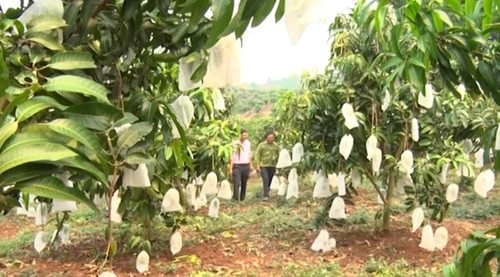 Chieng Hac Safe Agriculture Cooperative is the first cooperative in Yen Chau district to pilot organic mango plantation. (Photo: sonla.gov.vn) Chieng Hac Safe Agriculture Cooperative is the first cooperative in Yen Chau district to pilot organic mango plantation. (Photo: sonla.gov.vn)
|
The Chieng Hac Safe Agriculture Cooperative in Vang Lung hamlet was the first cooperative in Yen Chau district to grow organic mango.
Ha Van Son, the Cooperative’s Director, says it has 25 hectares of mango and longan, 15 of which use an organic production process. The rest have been given an export growing area code and are grown under the VietGap and Global Good Agricultural Practices (GlobalGAP) standards.
Son says that, since its establishment, the cooperative has embraced the goal of producing safe agricultural products.
“Under the model, our orchards must preserve the natural environment, ensure green coverage of bare hills, and bring economic benefits to the Cooperative members, so the model is safe, environmentally friendly, and responsible to the community and consumers,” according to Son.
He added, “Since our establishment, our fruits’ quantity, quality, and popularity has improved. Our fruits have been exported to Australia, the US, and China, and are available in big supermarkets nationwide.”
After a decade, organic farming has helped the Cooperative’s members earn an average income of about 8,700 USD per year.
Son said members carefully document the entire production process from the origin of the saplings, the soil conditions, and the type of fertilizers used to the procedures used in caring for the trees and harvesting the fruit.
The cooperative uses only organic fertilizers and herbicides, he said, noting that their costs in the first years were higher than the costs of inorganic fertilizers, but would then decrease, because the soil would gradually become more fertile, increasing the productivity and fruit quality year by year.
The one-hectare mango orchard of Ha Thi Duyen, a member of the Chieng Hac Cooperative, is verdant and laden with fruits thanks to the application of organic farming methods. She expects to harvest 10 tons this year.
Duyen said her family uses fermented maize and soy bean, for example, as fertilizer, and ginger, garlic, and chili as insecticide.
“In the past, we cared for the orchards inconsistently - putting down fertilizers and spraying chemicals regardless of the crop. This made for poor yields and products that couldn’t be sold at a high price. Now households with more experience help my family tend the mango orchard,” said Duyen, adding “We no longer use pesticides, but have changed to safe organic pesticides and fertilizers. When fruit is produced organically, high prices are more acceptable to consumers.”
Yen Chau district now has 60 cooperatives, 45 of which specialize in growing fruit trees. 29 cooperatives have received VietGAP certification. 27 are fruit tree cooperatives with a fruit tree area of 700 hectares.
The Yen Chau People's Committee manages the export growing area, a 1,000-hectare areas for exports to Australia, the US, and China. The area produces 10,250 tons per year.
Le Huy Phong, Vice Chairman of the Yen Chau People's Committee, says the district has 11,000 hectares of land devoted to mango, longan, and plum.
“For mango, longan, and plum, the district has encouraged farmers to adopt the VietGAP standards and strive to achieve the GlobalGAP standards. To be able to export its fruit to demanding markets, the district has pushed intensive, organic techniques to ensure the fruit’s quality. In addition, technical advances have been used to help growers participate in the global supply chain of agricultural products,” said Phong.
This year Yen Chau district hopes to earn 4 million USD by exporting 6,500 tons of fruit.
To achieve that goal, Yen Chau has increased communications, promotions, and introduction of its safe agricultural products to multiple markets, encouraged farmers to update their farming practices, and supported the development of local products toward a green, safe and sustainable agricultural production.